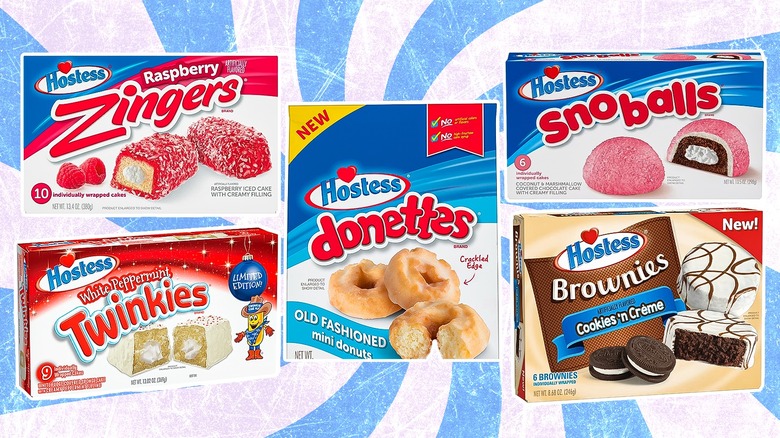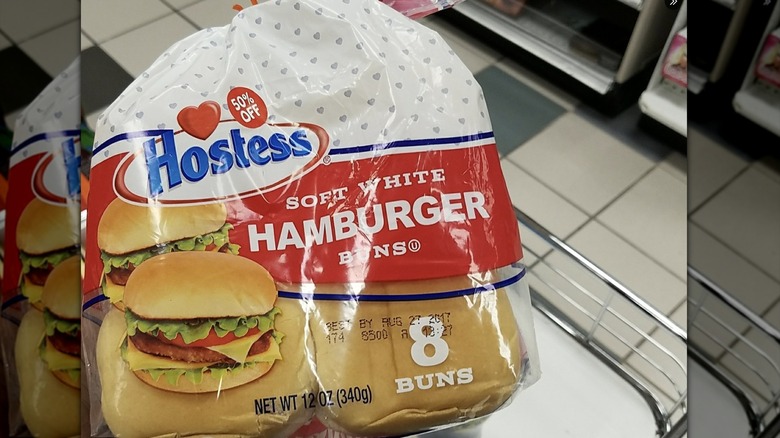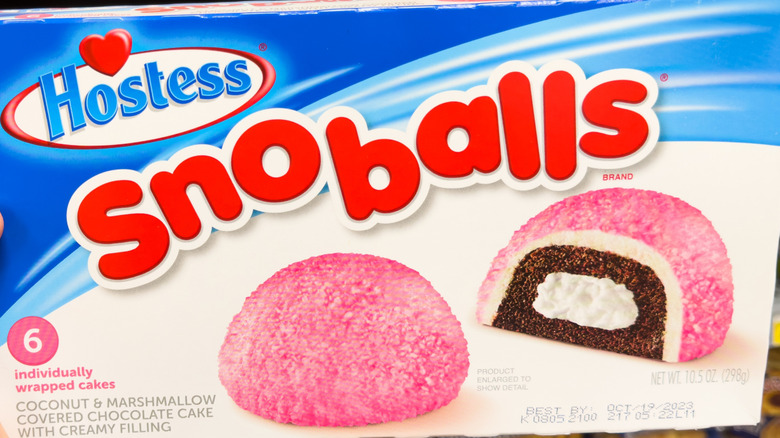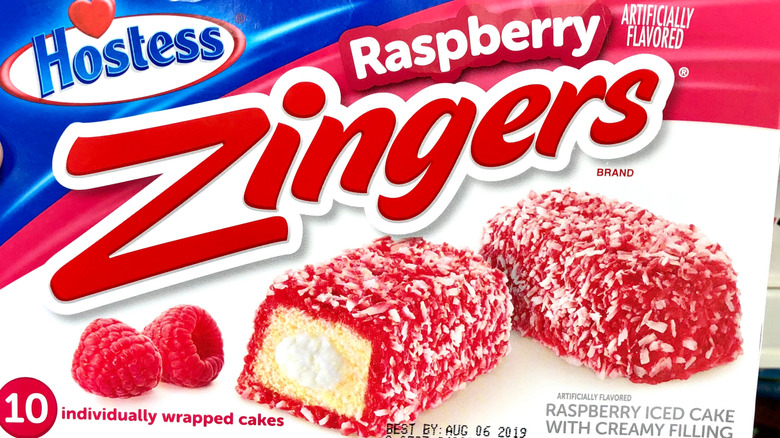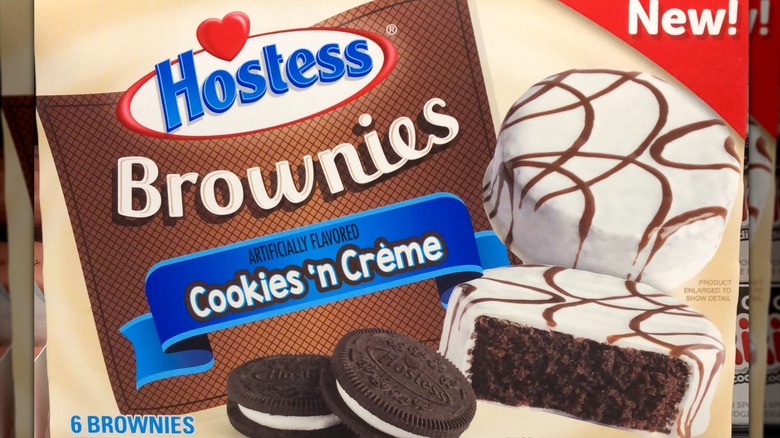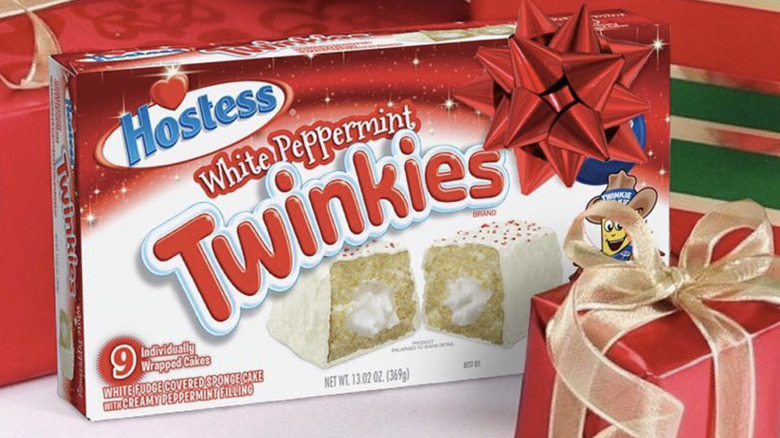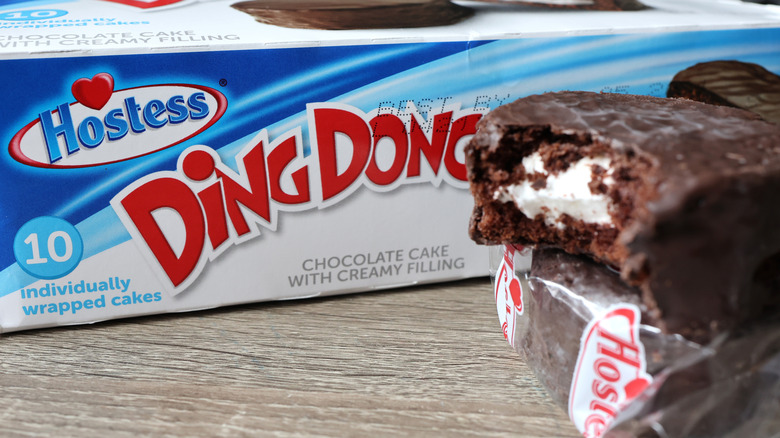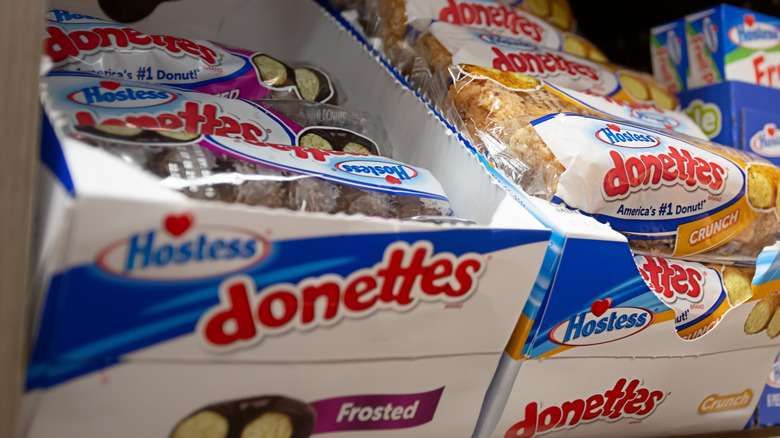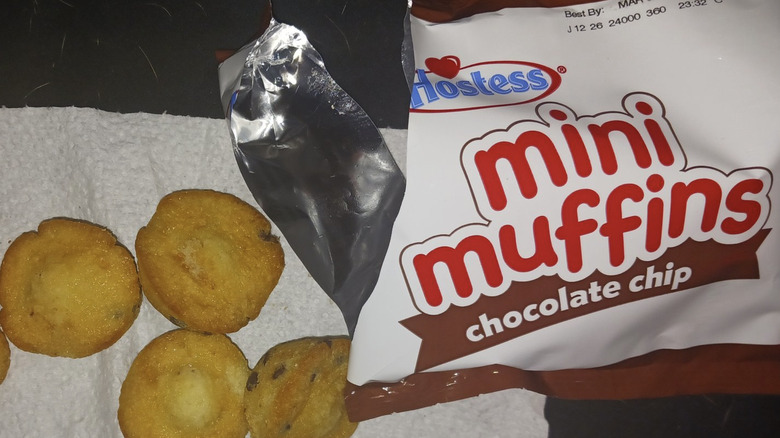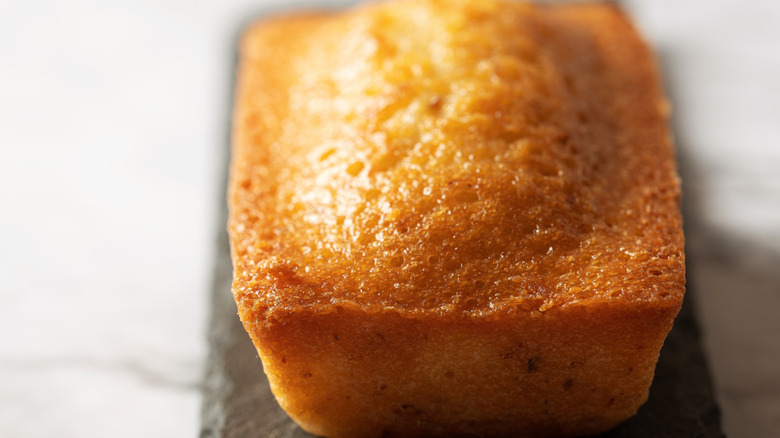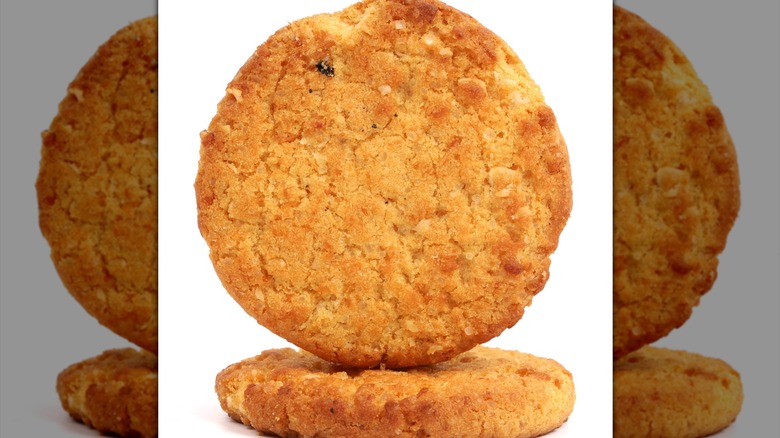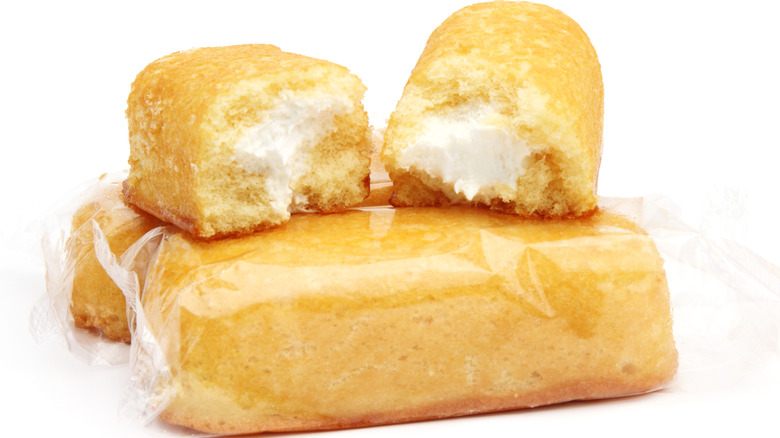The Biggest Recalls In Hostess History
Hostess has supplied us with some of the most recognizable and beloved snack cakes over the years. The company's origins date back to 1919 and endures to this day, but the business of selling Twinkies, HoHo's, and Hostess CupCakes to the masses hasn't been without flaws. The brand's legacy has taken quite a few twists and turns, some of which were triggered by some pretty serious food recalls as well.
Hostess' entire manufacturing operation is subject to inspection from federal agencies, mainly the Food and Drug Administration (FDA) and the Centers for Disease Control and Prevention (CDC). These public health groups work with organizations at the state level to uphold consumer safety. In part, that means monitoring and preventing the potential spread of food borne illnesses. If products that are unsafe for consumption are sold to the public before the issue is detected, the FDA will work with the manufacturing company to issue a food recall. It's a situation Hostess is a little too familiar with.
Product recalls are a huge financial burden for companies. A significant loss of inventory occurs when contaminated products get pulled from stores, but that's not all. Companies with a history of frequent recalls risk their reputations — shoppers don't buy food they think is unsafe to eat. Hostess hasn't always been on the public's sweet side and has the battle scars to prove it. Here are some of the biggest food recalls the confectionary kingpins have ever grappled with.
Soft White Hot Dog Buns and Soft White Hamburger Buns in 2021
Hostess was banned from the tail end of barbecue season in August 2021 due to a double whammy recall. Its Soft White Hamburger Buns and Soft White Hot Dog Buns were found to contain Salmonella and Listeria monocytogenes. The bacterial contamination wasn't totally on Hostess though. Both bread roll varieties were produced by a co-manufacturer, Best Harvest Bakeries, and the tainted products were discovered through Best Harvest Bakeries' environmental monitoring program. The Hostess buns were shipped to stores all over the U.S.
Once Hostess Brands became aware of the problem, it issued a voluntary recall for both types of buns and provided the public with the UPC codes on the affected packages. Some of the packages had "best by" dates that stretched into early October, causing concern that consumers might still be in possession of the bacteria-laden breads. The recall advised purchasers to dispose of the buns or return them for a refund. Salmonella and Listeria infections often present similar symptoms in afflicted people, including fever, nausea, diarrhea, vomiting, and abdominal pain. Listeriosis can also cause severe headaches, stiffness, and miscarriages or stillbirths in pregnant women.
A total of 32 batches of Soft White Hamburger Buns and 16 batches of Soft White Hot Dog Buns were recalled, accounting for 134,150 pounds of product. No illnesses were reported. Best Harvest Bakeries only produced select products for Hostess, so the brand's other breads and bagels were not affected.
SnoBalls in 2021
A manufacturing mixup at the Hostess plant in March 2021 was sno joke — it prompted nationwide food recall. A single batch of Hostess SnoBalls were shipped for distribution packaged in Hostess CupCake wrappers. While it might seem like a harmless glitch, the FDA was not having it. Selling SnoBalls in Hostess CupCake wrapping is technically illegal because the CupCake package doesn't list an allergen warning for coconut, which is a main ingredient in SnoBalls. Hostess alerted the public about the mislabeled batch through an FDA recall on April 10, 2021.
The Food Allergen Labeling and Consumer Protection Act of 2004 (which went into effect on January 1, 2006), requires product packaging to declare the presence of major food allergens. That means, food or supplements containing milk, eggs, fish, shellfish, tree nuts, wheat, peanuts, and soybeans must disclose it on the package. Although the American College of Allergy, Asthma and Immunology classifies coconuts as a fruit, the FDA thinks otherwise and classifies it as a tree nut. The packaging faux pas resulted in Hostess losing profit on some of its SnoBall inventory, but at least no illnesses were reported in connection to the recall.
Raspberry Zingers in 2020
There was one less comfort food in the snack cake aisle in 2020, though it was in the best interest of the public. The problem pertained to Hostess Brands' Raspberry Zingers, a snack cake with cream filling, raspberry-flavored icing, and coconut shavings. In July 2020, Hostess issued a recall on select packages of Raspberry Zingers because the cakes may develop mold prior to the best by date.
Five UPC codes and 11 batch numbers were named in the recall. They were a mixture of single-serve and multi-packs, and some batches were fresh while others were frozen. The "fresh" Raspberry Zingers had best by dates between August 26 and 29, 2020. The recall was initiated after Hostess caught wind of consumer complaints about dark patches of mold growing on the Zingers. Some shoppers took to social media, posting photos of the moldy Raspberry Zingers — it was an unsettling sight Hostess couldn't ignore.
One month later, Hostess hadn't eradicated the issue completely. The FDA published an expansion of the original recall on August 25, 2020. Five more UPC codes and 16 batch numbers were affected, and the inedible Raspberry Zingers had been shipped to food retailers nationwide. No illnesses were reported in the wake of Zingergate — but that's probably because very few people chowed down on the mold-covered cakes.
Cookies 'n Crème Brownies in 2018
Any excitement surrounding Hostess' all-new Cookies 'n Crème Brownies in 2018 was quickly dampened by an FDA recall, issued mere months after their release. In preparation for the rollout, Hostess Brands made an oversight: it forgot to include a "contains egg" allergen warning on the box. The FDA wasn't about to let this slide, and Hostess announced a voluntary recall of its Cookies 'n Crème Brownies on August 2, 2018.
Although egg was listed as an ingredient in Cookies 'n Crème Brownies, this wasn't enough to satisfy federal regulations. Egg is classified by the FDA as a major allergen alongside milk, fish, shellfish, tree nuts, wheat, peanuts, and soy. In conjunction with being included on the ingredient list, food items distributed for public consumption must bear a "contains" statement on its packaging. The FDA views a "contains" statement as an adequate allergen warning, to lessen the risk of consumers with common food allergies eating something they shouldn't because they didn't read the ingredients.
The Cookies 'n Crème Brownies recall affected 18,065 cases of product. The recall advised consumers with an egg sensitivity not to consume the brownies packaged under those lot numbers. Instead, customers could return the Cookies 'n Crème Brownies to the place of purchase for a refund. No illness reports occurred as a result of the mislabeled snack cakes, but as of 2024, Cookies 'n Crème Brownies appear to have joined the many discontinued Hostess snacks.
Holiday White Peppermint Twinkies in 2017
There wasn't much celebration surrounding limited-edition holiday Twinkies in early 2017, after Hostess had to recall them for potential Salmonella contamination. Hostess had launched a White Peppermint version of the ever-customizable Twinkie for the winter season, but the threat of foodborne illness stopped the festivities dead in their tracks. When Salmonella bacterium was detected in powdered milk manufactured by Valley Milk Products LLC, the situation set a domino effect of recalls into motion.
In November 2016, the U.S. Marshals Service seized over 4 million pounds of nonfat milk powder and buttermilk powder from Valley Milk, based in Strasburg, Virginia. An inspection two months prior uncovered a host of unsanitary practices, as well as the presence of Salmonella meleagridis. The FDA compelled Valley Milk to issue a voluntary recall, but when no action was taken, drastic measures were in order. On December 30, 2016, Blommer Chocolate Company, the leading cocoa processor and chocolate ingredient supplier in North America, recalled 636,206 pounds of its milk confectionery coating. The powdered milk used to make it came from Valley Milk.
Blommer Chocolate's recall tipped Hostess off about its salmonella-laced Twinkies. The company announced a voluntary Class II recall of Holiday White Peppermint Twinkies on January 9, 2017 and cited Valley Milk's contaminated powdered milk as the source of the pathogen. A total of 100,195 pounds of White Peppermint Twinkies were impacted by the recall.
The peanut residue problem of 2016
Major food corporations like Hostess have real reason to worry when one of its large-scale suppliers runs into food recall trouble. That was the state of affairs in May 2016 when Grain Craft alerted the FDA that peanut residue was inside its flour. Grain Craft, a 100-year-old company out of Chattanooga, Tennessee had isolated the source as soft red winter wheat, harvested on Georgia farmland in relative proximity to where peanut plants grew. Grain Craft mills flour and doesn't wholesale any peanut products, yet the peanut traces in one of its flour supplies tainted large batches of baked products including Cinnabon Stix, Chick-fil-A Chocolate Chunk Cookies, Rold Gold pretzel varieties, and Hostess donuts and snack cakes.
The admission left Hostess reeling. On June 3, 2016, the brand recalled a slew of products that had been produced with the flour but were not sold with a peanut allergen warning. The quantity of recalled goods amounted to 710,000 cases. The treats Hostess pulled from distribution included Chocodiles, DingDongs, Zingers, and five varieties of donuts. The recall affected the U.S. and Mexico. At the time the recall was issued, Hostess had received two reports of consumers suffering allergic reactions due to the undeclared peanut.
Donettes in 2014
In an ideal scenario, food companies prefer to catch quality issues in-house before any subpar offerings hit the market. In recent years, quality control experts at Hostess have failed to, quite literally, sniff out problems with the brand's pre-packaged baked goods. This left consumers responsible for sussing out their suspicions, and they weren't shy about putting Hostess' shortcomings on blast. Take for instance, the Donettes recall of 2014.
In August 2014, social media and local news outlets were full of consumer complaints stating that the packages of Hostess powdered Donettes were moldy and emitted a chemical-like smell. Initially, Hostess acknowledged the issue and cited the summer heat for an above-average moisture content within the packaging (lab testing confirmed this). By the end of August, the company recalled Donettes due to the presence of mold.
Pre-recall, news reports and Facebook complaints had honed in on powdered Donettes, however Hostess wasn't taking any chances. Hostess recalled multiple Donettes varieties — the recalled quantity of Frosted Donettes alone amassed 122,705 units. A decade after the recall, Hostess Donettes remain in production, and haven't been recalled since.
Chocolate Chip Mini Muffins in 2010
Hostess Mini Muffins have helped the brand maintain a foothold in the quick-serve breakfast market for many years running. A Mini Muffin recall in 2010 momentarily threatened the company's morning pastry presence. The problem boiled down to mislabeled packaging — it wasn't Hostess' first time mixing up food wrappers and it wasn't the last.
The recall was made public in September 2010, after Hostess confirmed to the FDA that a select amount of Banana Nut Mini Muffins were sealed into Chocolate Mini Muffin packaging. The manufacturer error was caught within one day's time, but it was impossible to ignore. Mini Muffins containing walnuts being housed in Chocolate Chip Mini Muffin bags that did not indicate an allergen warning for tree nuts posed a serious risk to unknowing consumers.
A one-day production snafu resulted in 38,302 pounds of Chocolate Chip Mini Muffins being recalled by the FDA. The high-risk tree allergen warranted a Class I recall. Consumers who had purchased the Mini Muffins, which were processed under a single UPC code were urged to return the product to the place of purchase for a full refund, Luckily, no illnesses were reported.
Mini pound cake in 2007
Long before Hostess introduced Baby Bundts, the company sold another tiny confection: the Mini Pound Cake. These delightful little treats were around in the mid-2000s, and even featured in Hostess' 2005 diffusion line, Las Delicias de Hostess, which specialized in snack cakes inspired by Latin American flavors. In 2007 however, Hostess was probably wishing nobody knew its Mini Pound Cakes existed, when they were recalled for an undeclared allergen.
In what would become a signature false move from Hostess, a select number of its Mini Pound Cakes contained carrot cake instead of the white cake indicated on the packaging. The carrot cake contained walnuts, but because it was packaged incorrectly, the ingredients list was completely inaccurate and there was no allergen warning disclosing the presence of tree nuts. The dangerous mistake led Hostess to recall 3,445 pounds of Mini Pound Cakes on May 10, 2007. By then, one reported allergic reaction due to the mislabeled cake had already been reported. Mini Pound Cakes are no longer sold by Hostess.
Oatmeal cookies in 2005
In order to keep up with competitors like Little Debbie's, Hostess has dabbled in cookies, bread, and even potato chips (they were all the rage in Canada in the '80s). The cookie angle has been a launch pad for new Hostess offerings on and off for years. In 2005, Hostess' oatmeal cookies took an "off" turn by way of a product recall due to the undeclared allergens of milk and eggs.
The old product and package switcheroo has been an issue for Hostess for way too long. One of the brand's most recent recalls, occurring in 2021, was for the exact same reason. The August 2005 recall dealt with Hostess chocolate chip cookies being wrapped in packages that were labeled for its oatmeal cookies. When the wrong product goes into a package set for nationwide distribution it's a major problem because everything the package says becomes untrue. The FDA knows this, we know this, and by now Hostess definitely knows this.
Customers who thought they were buying Hostess oatmeal cookies wound up with chocolate chip instead — annoying for oatmeal cookie lovers and potentially scary to those with allergies to milk or eggs. Since the wrappers failed to include an allergy notice for the milk and eggs the cookies contained, Hostess had to recall 9,797 pounds of them. In happier news, no reported illnesses were linked to the factory error.
Asbestos scare in 1998
Hostess' first brush with FDA recall territory was also one of its most catastrophic. It happened in January 1998, when problems at the company's manufacturing plant in Schiller Park, Illinois resulted in a large number of Hostess products becoming unsafe for consumption. Interstate Bakeries Corp., Hostess' parent company at the time, had some serious answering to do when 14 products made by the corporation were pulled from distribution in 21 states over potential asbestos contamination. The number of recalled snack cakes was in the millions.
Asbestos, a group of naturally occurring minerals that can be bundled into fibrous threads, was hugely popular in industrial construction throughout the 20th century due to its flame resistant properties. Once it became widely known that asbestos causes numerous types of cancer, it was gutted from countless American buildings. When Interstate Bakeries initiated asbestos removal in its Schiller Park plant, things went awry. It was alleged that Interstate Bakeries ordered unlicensed workers to remove pipes and insulation from the premises without disclosing the knowledge that they contained asbestos.
This omission meant that asbestos went uncontained in the environment during the removal process, directly exposing millions of snack cakes. The plant was shut down by public health officials and underwent a state-monitored cleanup before it reopened. Interstate Bakeries filed for bankruptcy protection in 2004 and again in 2012. Interstate Bakeries ultimately liquidated its assets and temporarily wiped Hostess snack cakes from existence, before the company resurfaced in 2013.
